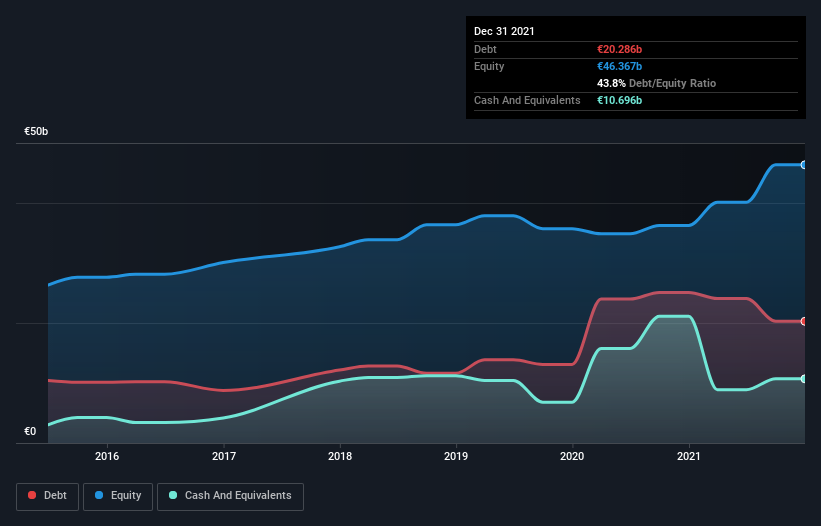
Some say volatility, rather than debt, is the best way to think about risk as an investor, but Warren Buffett famously said that 'Volatility is far from synonymous with risk.' So it seems the smart money knows that debt - which is usually involved in bankruptcies - is a very important factor, when you assess how risky a company is. As with many other companies Christian Dior SE (EPA:CDI) makes use of debt. But the real question is whether this debt is making the company risky.
When Is Debt A Problem?
Debt assists a business until the business has trouble paying it off, either with new capital or with free cash flow. Ultimately, if the company can't fulfill its legal obligations to repay debt, shareholders could walk away with nothing. While that is not too common, we often do see indebted companies permanently diluting shareholders because lenders force them to raise capital at a distressed price. Of course, the upside of debt is that it often represents cheap capital, especially when it replaces dilution in a company with the ability to reinvest at high rates of return. The first thing to do when considering how much debt a business uses is to look at its cash and debt together.
View our latest analysis for Christian Dior
What Is Christian Dior's Net Debt?
You can click the graphic below for the historical numbers, but it shows that Christian Dior had €20.3b of debt in December 2021, down from €25.1b, one year before. However, it does have €10.7b in cash offsetting this, leading to net debt of about €9.59b.

How Strong Is Christian Dior's Balance Sheet?
Zooming in on the latest balance sheet data, we can see that Christian Dior had liabilities of €28.0b due within 12 months and liabilities of €48.0b due beyond that. Offsetting these obligations, it had cash of €10.7b as well as receivables valued at €6.11b due within 12 months. So its liabilities total €59.2b more than the combination of its cash and short-term receivables.
While this might seem like a lot, it is not so bad since Christian Dior has a huge market capitalization of €109.3b, and so it could probably strengthen its balance sheet by raising capital if it needed to. But it's clear that we should definitely closely examine whether it can manage its debt without dilution.
In order to size up a company's debt relative to its earnings, we calculate its net debt divided by its earnings before interest, tax, depreciation, and amortization (EBITDA) and its earnings before interest and tax (EBIT) divided by its interest expense (its interest cover). Thus we consider debt relative to earnings both with and without depreciation and amortization expenses.
Christian Dior has a low net debt to EBITDA ratio of only 0.50. And its EBIT easily covers its interest expense, being 89.1 times the size. So we're pretty relaxed about its super-conservative use of debt. Even more impressive was the fact that Christian Dior grew its EBIT by 112% over twelve months. If maintained that growth will make the debt even more manageable in the years ahead. There's no doubt that we learn most about debt from the balance sheet. But it is Christian Dior's earnings that will influence how the balance sheet holds up in the future. So if you're keen to discover more about its earnings, it might be worth checking out this graph of its long term earnings trend.
Finally, a company can only pay off debt with cold hard cash, not accounting profits. So we clearly need to look at whether that EBIT is leading to corresponding free cash flow. During the last three years, Christian Dior generated free cash flow amounting to a very robust 90% of its EBIT, more than we'd expect. That puts it in a very strong position to pay down debt.
Our View
Christian Dior's interest cover suggests it can handle its debt as easily as Cristiano Ronaldo could score a goal against an under 14's goalkeeper. But truth be told we feel its level of total liabilities does undermine this impression a bit. Zooming out, Christian Dior seems to use debt quite reasonably; and that gets the nod from us. While debt does bring risk, when used wisely it can also bring a higher return on equity. There's no doubt that we learn most about debt from the balance sheet. But ultimately, every company can contain risks that exist outside of the balance sheet. For instance, we've identified 1 warning sign for Christian Dior that you should be aware of.
If, after all that, you're more interested in a fast growing company with a rock-solid balance sheet, then check out our list of net cash growth stocks without delay.
New: AI Stock Screener & Alerts
Our new AI Stock Screener scans the market every day to uncover opportunities.
• Dividend Powerhouses (3%+ Yield)
• Undervalued Small Caps with Insider Buying
• High growth Tech and AI Companies
Or build your own from over 50 metrics.
Have feedback on this article? Concerned about the content? Get in touch with us directly. Alternatively, email editorial-team (at) simplywallst.com.
This article by Simply Wall St is general in nature. We provide commentary based on historical data and analyst forecasts only using an unbiased methodology and our articles are not intended to be financial advice. It does not constitute a recommendation to buy or sell any stock, and does not take account of your objectives, or your financial situation. We aim to bring you long-term focused analysis driven by fundamental data. Note that our analysis may not factor in the latest price-sensitive company announcements or qualitative material. Simply Wall St has no position in any stocks mentioned.
About ENXTPA:CDI
Christian Dior
Through its subsidiaries, engages in the production, distribution, and retail of fashion and leather goods, wines and spirits, perfumes and cosmetics, and watches and jewelry worldwide.
Flawless balance sheet and fair value.
Market Insights
Community Narratives




